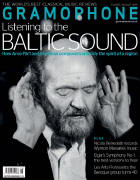Texte paru dans: / Appeared in: |
|
 |
Outil de traduction (Très approximatif) |
|
Reviewer: Jonathan Freeman-Attwood Bach’s pair of first cousins once-removed, Johann Christoph and Michael, have long been acknowledged as key influences in Johann Sebastian’s evolving craft as a teenager. We have Reinhard Goebel largely to thank for the first serious introduction to the vocal works in his seminal 1986 releases on Archiv, ‘Die Familie Bach vor Bach’ (2/87). Vox Luminis take this micro-tradition – peculiarly unlike anything else, either Schützian or Buxtehudian – on to another level of enquiry. With their intensely euphonious ensemble writing and the meticulously crafted melodic treatment of colourful biblical texts, both Bachs (and the ruddy strains of great-uncle Heinrich Bach) are given rapt and ringing performances here, from the ruminating opening of Michael’s Ach bleib bei uns to the ecstatic chorale filigree of Christoph’s mature Herr, wende dich. One of the key differences between Vox Luminis and many other such ensembles (particularly those of the pioneering generation of the 1980s and ’90s) is how homogeneity is challenged as the default priority. As you can hear in Christoph’s dialogus Die Furcht des Herren, there is no shortage of purple-rich blend and supreme tuning but, alongside, singers and instrumentalists are expected to react, copy or dissent, according to both the text and the abstract direction of the music. The strong identities within the ensemble allow for new lyrical dimensions to emerge here, for instance when Wisdom (as an allegory protagonist) projects her fount of knowledge in the face of the second soprano’s role as ‘humility’ in person. It’s deeply affecting. Christ lag in Todesbanden’s dazzling extension of the rhetorical and technical armoury of his ancestors is afforded a deeply accomplished reading by Vox Luminis. As, surely, Johann Sebastian’s first great work, Cantata No 4 makes especially glorious sense after this legacy preamble. Lionel Meunier lets the music breathe, always resisting forced or mannered declamation. Note the skipping alleluias of Versus 1, and how they are then quietly caressed in Versus 4, the unison organ adding to a calculated weight in the final devotions. Christoph’s cantata Es erhub is given an exceptionally graphic portrayal of St Michael’s victory over the dragon, as relayed by the terrifying clangour of four trumpets and drums – an apt celebration of the Bach family’s finest son before JSB. Throughout this beguiling programme, Vox Luminis inhabit a world from which you’ll need to drag yourself away. |
|




